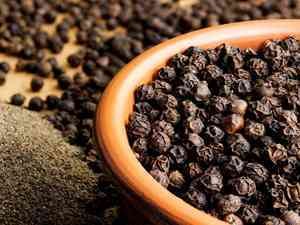TOP 12 HEALTH BENEFITS OF BLACK PEPPER (Kaali Mirch)
 Native to present-day Kerala in Southwestern India, BLACK PEPPER is the fruit of the black pepper plant from the Piperaceae family. The fruit, actually known as ‘peppercorn’ is usually dried and used as a spice and seasoning in kitchens. Ground peppercorn is commonly called ‘pepper powder.’ Depending upon the type of processing of the peppercorns, pepper is termed as black pepper or white pepper. For black pepper, peppercorns are picked when almost ripe and are then dried in the sun, which turns the outer layer black. To produce white pepper, the outer layer of peppercorn is removed before or after drying, which leaves the inner seed exposed. White pepper tastes hotter than the black one but has fewer flavor notes in comparison. The chemical compound piperine gives pepper its distinctive spiciness.
Native to present-day Kerala in Southwestern India, BLACK PEPPER is the fruit of the black pepper plant from the Piperaceae family. The fruit, actually known as ‘peppercorn’ is usually dried and used as a spice and seasoning in kitchens. Ground peppercorn is commonly called ‘pepper powder.’ Depending upon the type of processing of the peppercorns, pepper is termed as black pepper or white pepper. For black pepper, peppercorns are picked when almost ripe and are then dried in the sun, which turns the outer layer black. To produce white pepper, the outer layer of peppercorn is removed before or after drying, which leaves the inner seed exposed. White pepper tastes hotter than the black one but has fewer flavor notes in comparison. The chemical compound piperine gives pepper its distinctive spiciness.
Black pepper is extensively cultivated in Southwestern India and in tropical regions of the world. Since antiquity, it has been used as both spice as well as medicine. Due to its high concentration of potent, beneficial plant compounds, it is widely used in Ayurvedic medicine. Here are some of the top health benefits of black pepper:
1. Prevents skin problems: Black pepper prevents the skin pigmentation disease called vitiligo that causes some areas of skin to lose its normal pigmentation and turn white. Loaded with piperine, black pepper helps in restoring the natural color of the skin. A research in Oregon Health & Science University revealed that the piperine content of pepper can stimulate the skin to produce melanocytes pigment. In comparison to chemical-based treatment for vitiligo, treatment with piperine combined with ultraviolet light therapy is a much better option. Although results from animal studies are positive, more research is needed to verify its effectiveness in humans.
2. Improves blood circulation and skin health: Black pepper ensures blood circulation to different parts of the body and proper skin rejuvenation. Including black pepper in diet since young age helps keep skin deformations such as premature ageing, wrinkles, and dark spots at bay. Black pepper also keeps skin problems such as pimples or acne under control and can also be used in crushed form for skin exfoliation.
3. Reduces toothache: Black pepper can effectively reduce toothache and can fight against other gum-related problems. Its antimicrobial and antibacterial properties help prevent the growth of bacteria in the mouth and help keep your mouth fresh.
4. May lower cholesterol levels: Doctors often recommend including black pepper in the diet of patients suffering from heart diseases because it removes the cholesterol build up in the arteries. Medical conditions such as atherosclerosis can be avoided by taking black pepper regularly. Additionally, black pepper and piperine are believed to boost the absorption of dietary supplements that have potential cholesterol-lowering effects. Studies have shown that black pepper may increase the absorption of the active component of turmeric called curcumin by up to 2,000%. Still, more studies are, however, needed to ascertain whether black pepper itself has any significant effects on lowering cholesterol in humans.
5. Improves brain functions: Studies have shown that black pepper significantly enhances brain functionality and helps reduce memory impairment and cognitive malfunction. In animal studies, piperine present in black pepper has been demonstrated to benefit brain function and alleviate symptoms related to degenerative brain conditions like Alzheimer’s and Parkinson’s disease. The chemical pathways in the brain seem to be stimulated by this organic compound. A rodent study revealed that the memory of the rats with Alzheimer’s disease was improved by piperine, as the distribution of the compound enabled them to repeatedly run a maze more efficiently than the rats that were not given piperine.
In another study on rats, piperine extract seemed to decrease the formation of amyloid plaques, which are dense clumps of damaging protein fragments in the brain that have been linked to Alzheimer’s disease, thus improving the symptoms of this degenerative brain disease. However, studies in humans are still needed to verify whether these effects are also observed in human beings, though there’s a great likelihood that black pepper benefit Alzheimer’s patients and those suffering from other age-related or free radical-related malfunctions in cognition.
6. Remedy for Depression: The compound piperine present in  black pepper is quite beneficial for those suffering from depression because of its antidepressant-like effects. When raw black pepper is chewed, mood-inducing chemical is released from the brain, and this fills the mind with a relaxing, tranquil mood. Studies published in journals such as Journal of Food and Chemical Toxicology have shown that regular intake of black pepper helps lessen depression.
black pepper is quite beneficial for those suffering from depression because of its antidepressant-like effects. When raw black pepper is chewed, mood-inducing chemical is released from the brain, and this fills the mind with a relaxing, tranquil mood. Studies published in journals such as Journal of Food and Chemical Toxicology have shown that regular intake of black pepper helps lessen depression.
7. May have anti-cancer properties: Researchers hypothesize that piperine which is an active component in black pepper, may also have cancer-fighting properties. Although no human trials have been performed, test-tube studies revealed that piperine retards the replication of breast, prostate, and colon cancer cells. Another test-tube study screened 55 compounds from different spices and found that black pepper’s piperine was the most efficient in increasing the effectiveness of traditional treatment for triple-negative breast cancer.
8. Boosts digestive system: Black pepper promotes good gut health and boosts overall functioning of your digestive system. Consumption of raw black pepper aids the breakdown of proteins by causing the stomach to release hydrochloric acid. This acid is essential for digestion process and by causing an increase in its secretion, black pepper helps the body to digest food. Besides preventing the formation of intestinal gas, it also helps in cleaning the intestines, removing toxins from the body, and combating gastrointestinal diseases.
9. Prevents constipation: Daily consumption of black pepper aids proper bowel movement and prevents problems like constipation and diarrhea.
10. Soothes pain due to peptic ulcer: The rich content of antioxidants in black pepper and the latter’s anti-inflammatory properties help soothe pain and discomfort caused by peptic ulcer. Black pepper is also found to combat problems that occur due to ethanol.
11. Helps relieve joint pain: Regular intake of black pepper helps prevent arthritis and joint pain. Black pepper essential oil has a warming effect that boosts blood circulation when applied to the skin; this helps the patients suffering from arthritis get rid of the pain naturally. Black pepper also helps remove toxin like uric acid from the body, which is very harmful to people with arthritis. The medicinal properties of black pepper also help combat gout.
12. Treats cough and sore throat: Black pepper has expectorant properties which help reduce the symptoms of cough and other respiratory problems. Consuming food prepared with black pepper is useful in winters and facilitates removal of phlegm from the body. Black pepper also helps prevent chest congestion and asthma due to its expectorant and strong anti-inflammatory properties.
To read this article in Hindi, click here
Disclaimer: The content on this website is not intended to be a substitute for profes-sional medical advice or treatment. Although most foods are generally safe, some of them may have side effects. Ask4healthcare advises these to be taken/practised at user’s own discretion.
- Are you troubled by ACIDITY / HEARTBURN? - September 13, 2019
- Ways to tackle INSOMNIA - September 12, 2019
- Eliminating the need for anti rejection drugs in transplant patients - September 6, 2019

Nice post for everyone for healthy life. Useful information is given in this blog.